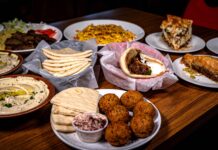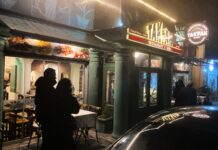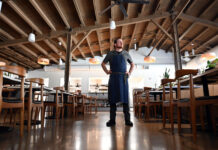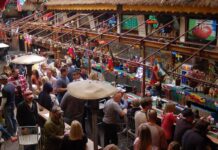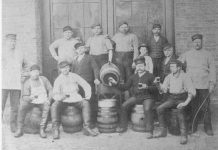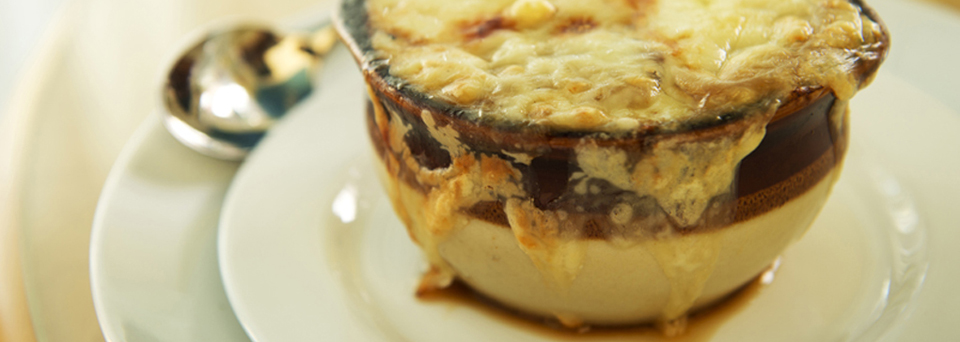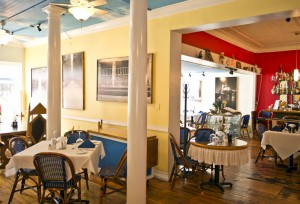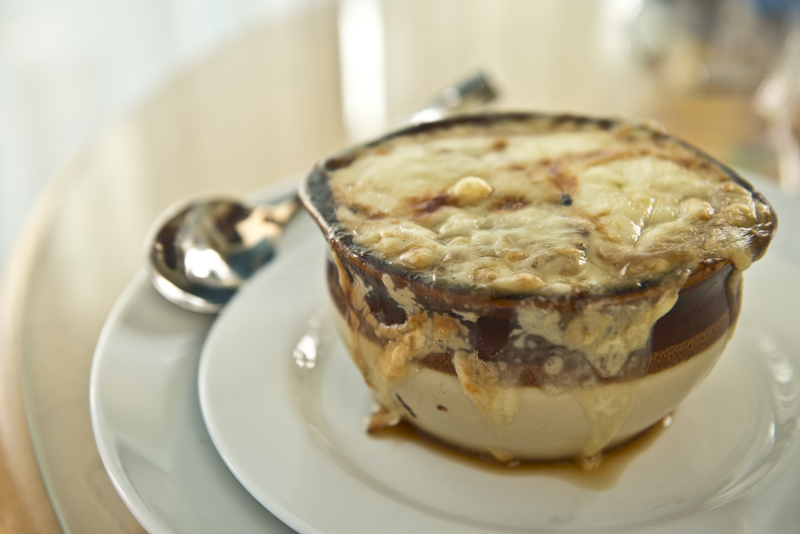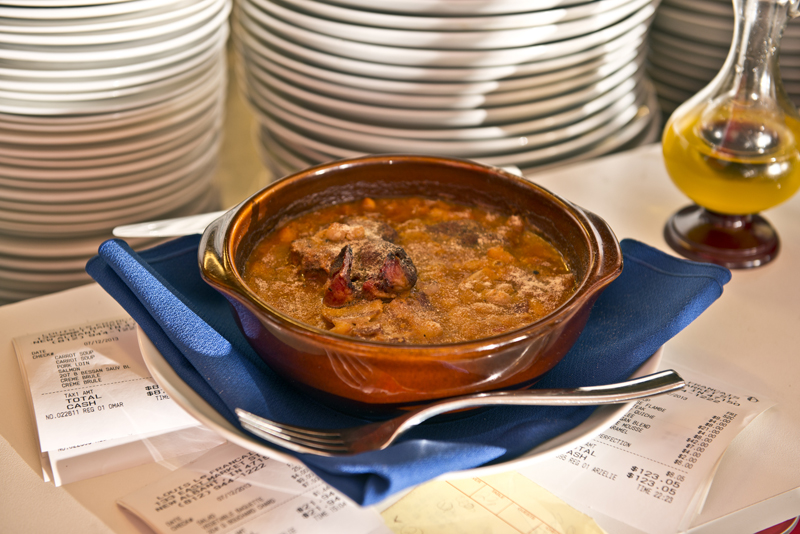Some 4,285 miles east of New Albany, Indiana, lies the French village of Miradoux, where chef Louis Retailleau was born.
Set in the agriculturally abundant Gascony region, Miradoux’s landscape is reminiscent of Kentucky or Southern Indiana: gentle hills, a river, pastures where cows graze. It was this rich setting that launched Louis, at age 14, into a life of food and a decades-long journey that led eventually to Louis Le Français, a brightly painted restaurant on New Albany’s Market Street where Louis serves as chef, owner, and de facto king.
Everyone calls him Louis — pronounced the French way, Louie. His last name is pronounced, approximately, “Ray-tay-o,” but nobody ever uses it.
To speak with Louis is to imagine you can read bits of his journey in the lines on his face. To watch him cook in the kitchen he designed — bending energetically to pull a dish from the oven, his silver hair flopping gracefully over a red bandanna — is to witness an expertise and professional verve developed over decades. (How many decades, Louis won’t say. When asked his age, he parries with wit: “I’m 52 standing up and 26 lying down.”) To taste his duck confit with cherry sauce, or his boeuf bourguignon, is to experience flavors dense and dark, rich and caramelized—classic French cookery in the hands of a master. “My mission here is to make people happy with what I do,” he says. “Food is an art. Art is infinite. If you do the same dish tomorrow, it’s a different dish.”
A slightly built man with the characteristic long French nose, Louis recounts his life in restaurants quietly, with a bit of a shrug in his voice. As he speaks, you get the sense he has seen a lot and expects to see more.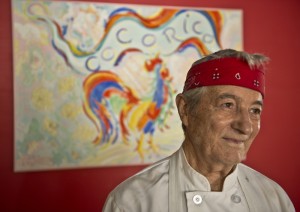
AN APPRENTICESHIP
The youngest of four brothers — one who became a policeman, two who became chefs — at age 14, Louis began an apprenticeship with a friend of his father’s, in a charcuterie in the nearby town of Agen. “I used to bicycle from farm to farm with Georges,” he remembers, “and kill the pig and prep it all the way from blood sausage to ham to roast.” Next he moved on to a charcuterie in Cahors, where the truffle is king, and from there, to Paris to work in a hotel restaurant with his brother. “My brothers were very protective of me, because I was the baby,” he recalls. “They didn’t want me to do what they did. But,” he says simply, “I did.”
In 1955, he joined the French Navy and spent two years in Morocco managing food, drinks, and lodging for officers in the war room. His next stop was London, where he spent a year in the restaurant at the famous Savoy hotel. His front- and back-of-house experiences taught him “every angle of the business,” he says. “Dishwasher, cleaning, sanitation. The customer. The food, the wine, the heat, the air conditioning, the floor, the ceiling.” That breadth of knowledge convinced him that the best restaurant is a small one, fully within the dominion of the owner/chef.
Following his stint at the Savoy, he crossed the Atlantic to spend a year in Quebec City, then seven more in New York, doing restaurant consulting. He married and moved to his wife’s native Chicago. When the John Hancock Tower opened, he worked there in banquet services.
Then, in 1970, he struck out on his own. For his first restaurant, he chose the name Bon Appetit and a location in Calumet City, south of Chicago. “It was the worst spot you can think of,” he recalls, “where the ladies of joy were working. It was the bordello of the world, but I didn’t know.” Located in a shopping center, boasting just 32 seats, Bon Appetit had every reason to fail—and yet, it was “my biggest success. On weekends we’d have 70 people; on Saturdays, over 100.”
After six years, Louis moved to Crown Point, Indiana, and opened a new restaurant called Louis’ Bon Appetit. For thirty years he presided over that restaurant, briefly layering on a second venture when he ran Cocorico in Chicago from 1992 to 1994. But in 2006, his marriage came apart. Newly divorced and at loose ends, Louis left the Midwest for San Francisco, only to return to Indiana after an unsatisfactory couple of years.
Still searching for his next endeavor, he got into his car and headed south. Interstate 65 took him to Louisville. A friend suggested he stay, since there was no competition for a French restaurant — a real French restaurant,
Louis clarifies, run by an actual Frenchman. But his search for restaurant space faltered until, in 2010, he found a space for rent in New Albany.
He hated the space. But he saw possibilities. If the restaurant was going to work, it was going to have to become Louis’s space: kitchen to dining room, heating to air conditioning, floor to ceiling. He gutted the property and spent nearly a year doing wholesale renovation. Finally, in the spring of 2011, Louis Le Français — which translates simply as “Louis the Frenchman” — opened its doors.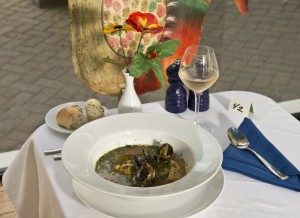
A LITTLE ISLAND OF FRANCE
The French ambiance is palpable at Louis Le Français. Classic Parisian café chairs seat just shy of 60 guests in the intimate dining room. Every evening features live guitar music. Beautifully shot black-and-white photos of French landmarks line the walls. And everywhere, there’s the Gallic rooster — the country’s unofficial symbol — painted in bright strokes of red, blue, and yellow. Everything is French: “The food, the décor, the ambiance,” Louis says. The menu features classic dishes such as beef Bourguignon, sweetbreads (surprisingly popular), and cassoulet. He has taken pains to provide a modestly priced lunch, at which five entrees cost less than $10 and spinach crepes are only $7.
“It’s a very simple thing,” Louis says of his carefully constructed menu, “but simplicity is difficult to do.”
Contributing to the French atmosphere are the people who work there. “They have to think French, act French, talk French, feel French,” Louis says. And indeed, when a server, who hails from seven miles outside Paris, notices a sudden rainshower pattering down outside, she marks it with an unselfconscious “ooh-la-la.”
“It’s my little island of France in here,” Louis continues. “This is French soil. It could be anywhere” — meaning New Albany, Chicago or maybe the moon — “but it will still be France.”
So it’s ironic that one of Louis’s biggest challenges is a geographic one — the mighty Ohio river and the Sherman Minton bridge. For too long, many Louisvillians have treated the river as closed border. But with the emergence over the past few years of an increasingly eclectic restaurant scene — to which Louis brings needed ethnic diversity — and continued interest in the renovation of New Albany’s rich architectural heritage, that border might be dissolving. Louis knows it’s up to him to try to dissolve that psychological barrier between his restaurant and potential customers. “There must be a reason why they cross the bridge,” he acknowledges. “I work hard in order to prove to people, yes, you can have dinner [in New Albany] and enjoy it. As a motto, I say: You don’t need to have a passport to go to France.”
As you talk to Louis, you realize his dining room is not just intimate, it’s personal, reaching back to his roots in Miradoux. The large, two-hundred-year old pendulum clock hanging in the front dining room belonged to his parents, whose pictures also hang on the wall. When Louis winds that clock, it’s a ritual, and the sound of its chimes can bring tears to his eyes. “I’m a little bit emotional when it comes to that,” he admits.
About the only non-French element of the restaurant is the American front-of-house manager, Betty Weber, a one-time French teacher. Weber runs the front of house with an efficient hand and fusses over Louis a bit, making sure he stops by a table to greet special customers and insisting that a visitor learn about the award the French government bestowed on Louis in the 1990s for representing French culture in America. The discussion about the award leads Louis to disappear into the kitchen, from which he emerges with an oversized, stuffed-to-bursting scrapbook. Soon the particulars of the award are forgotten as Louis thumbs through pictures of his clients, his restaurants, and most of all, his children, now grown. Seemingly every note or card he’s ever received from son Sascha and daughter Natalie is lovingly displayed in the album, and Louis lingers over the notes, each worded differently but all conveying the message, “I love you, Papa.”
But it’s a busy night at the restaurant, and reluctantly he closes the scrapbook to return to his kitchen. He knows the path he has set for himself is not the easiest. The Gallic way of dining — the leisurely pace, the focus on quality as opposed to the value-meal approach — runs counter to many American diners’ expectations. His mission, quite simply, is to persuade his guests of the abundant pleasures of the French culinary tradition. When customers tell him they feel as if they’ve been transported to France, Louis is happy. “These,” he says, “are my people.”
Louis Le Francias
133 East Market Street
New Albany, Indiana
812.944.1222


